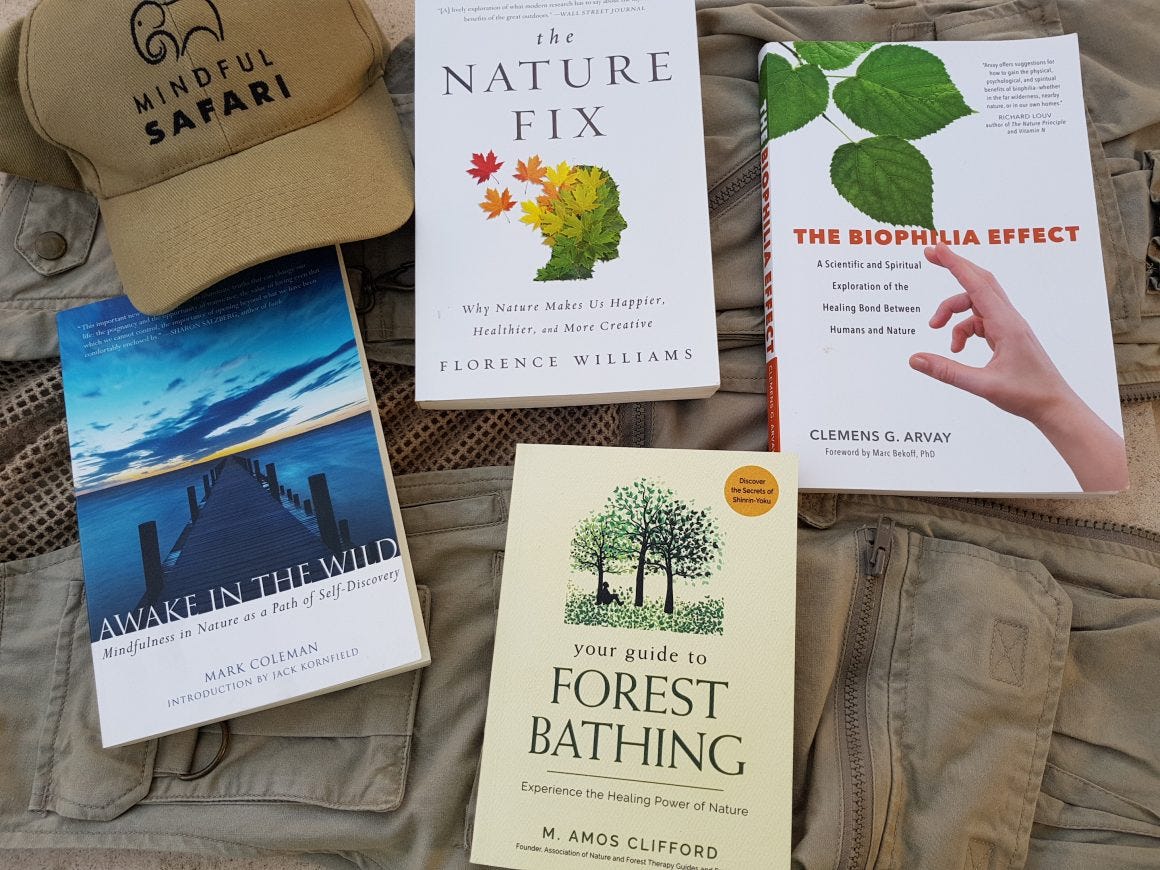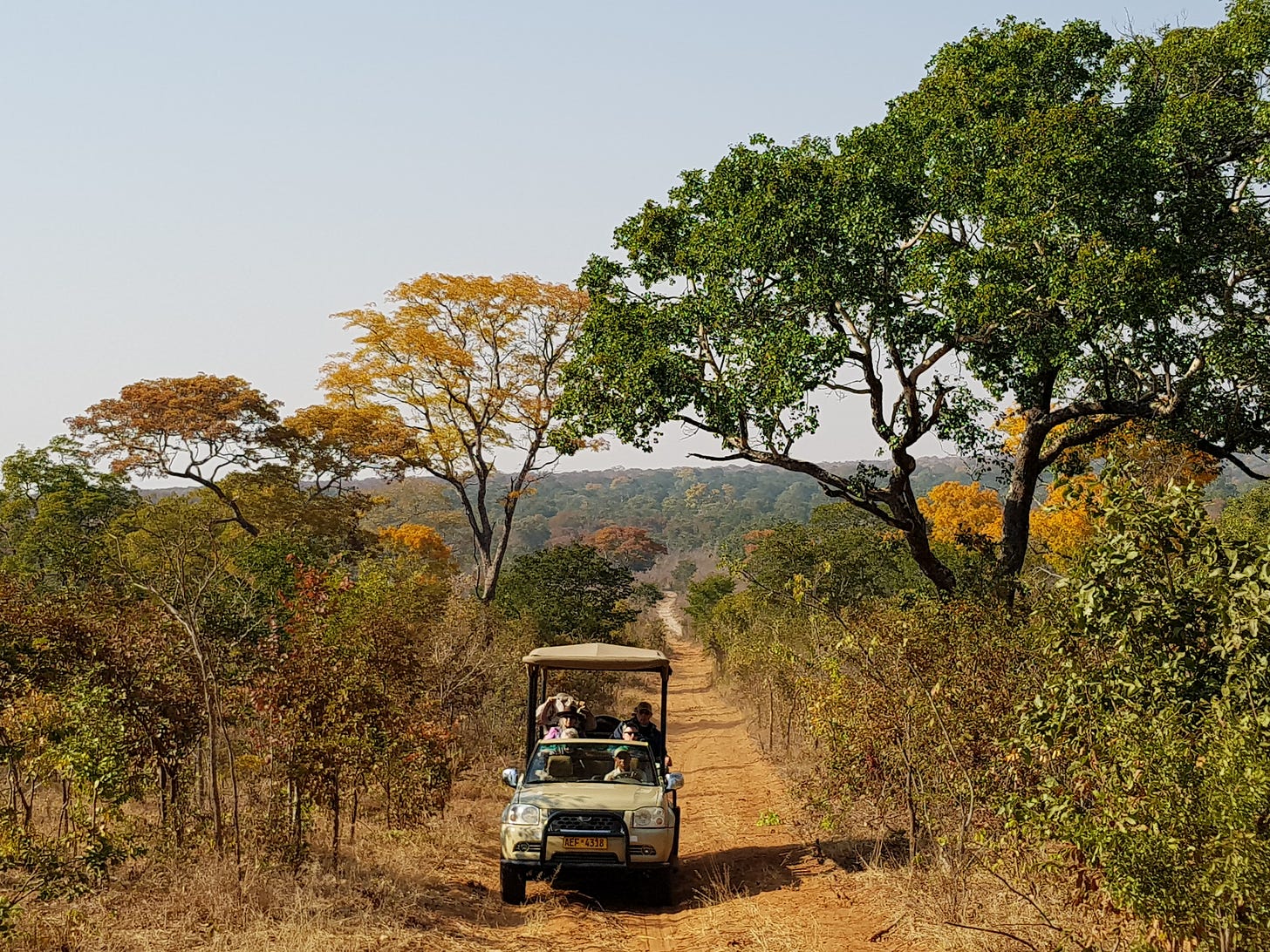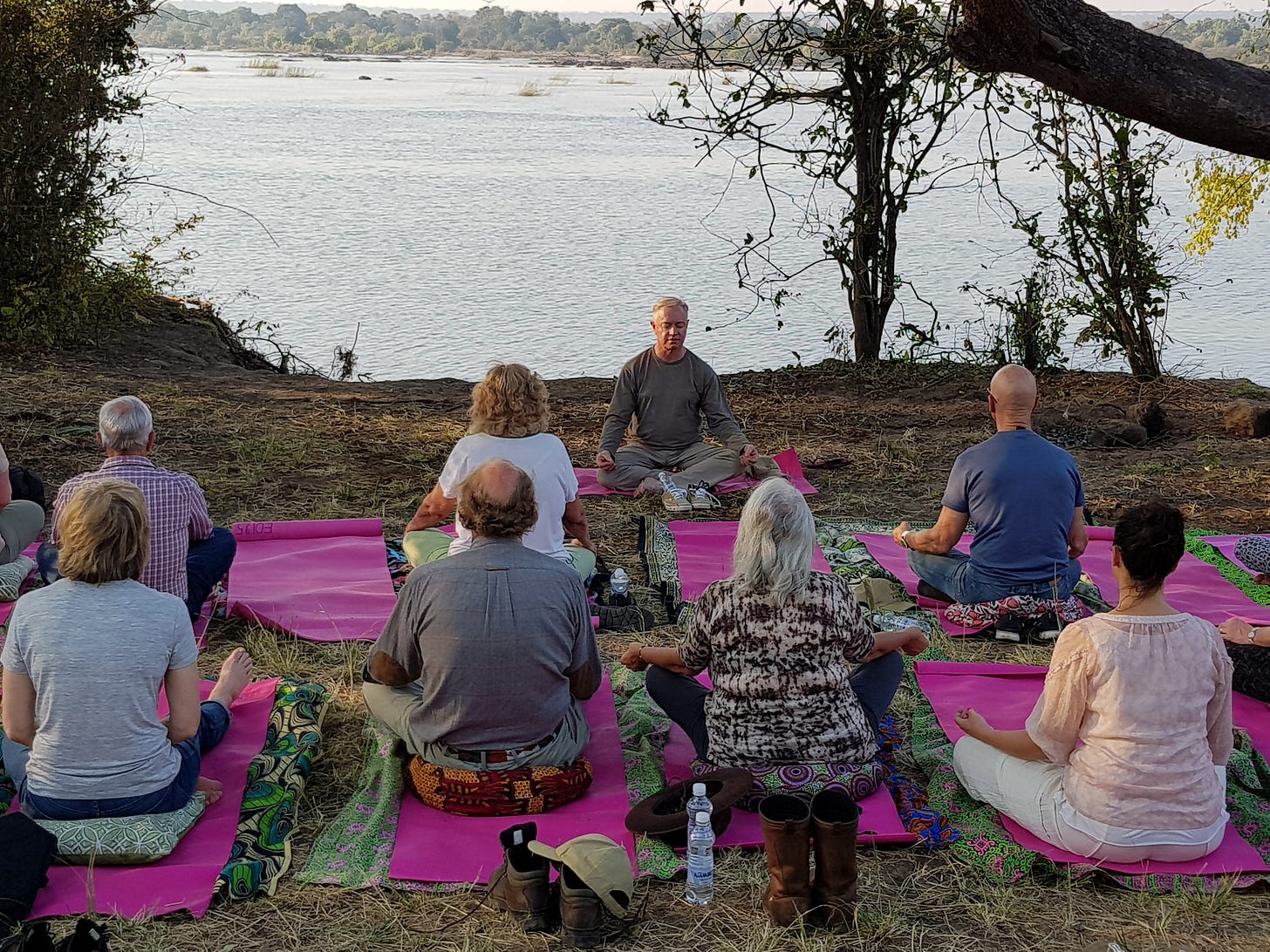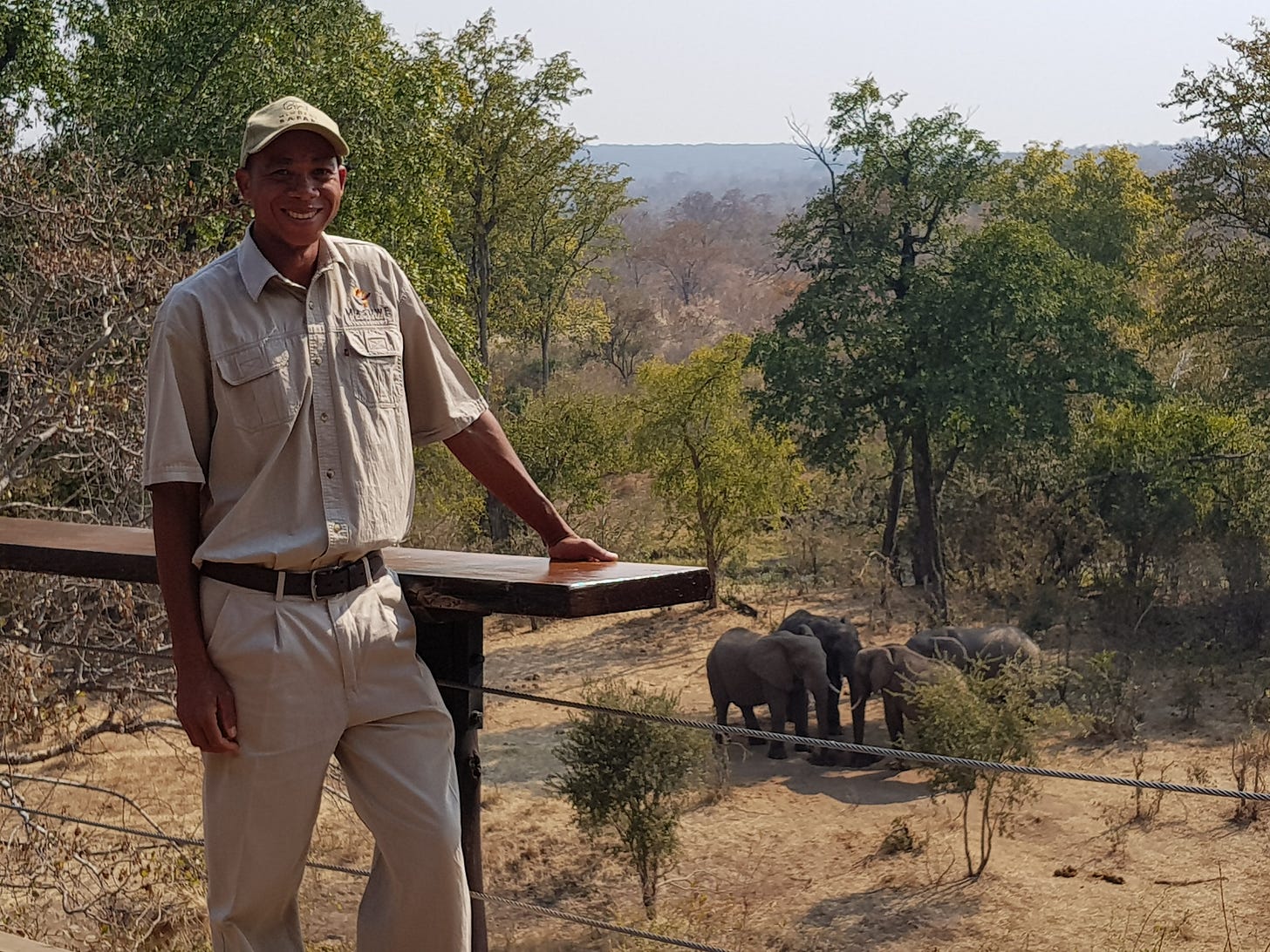Mindful Safari is all about being here and now, among some of the most extraordinary vistas in Africa. And spending time with iconic wildlife in their own habitat. Even though the emphasis of these special visits is non-conceptual – that is, simply being present – in recent years a number of excellent books have been published offering a conceptual understanding about the impact of spending time in nature.
For members of the Mindful Safari family, past, present and future, I thought you may find it helpful to have a short list of books which provide insightful context for our time in the bush.
These are by no means the only books on this subject – recent years has seen a spate of similar publications. But they are ones that I personally recommend.
The Nature Fix and The Biophilia Effect
The Nature Fix by Florence Williams (2017) and The Biophilia Effect by Clemens G. Arvay (2015, English edition 2018) are both wonderful books covering much the same ground – that is, the powerful and positive effects of nature on both mind and body.
Florence Williams is an American journalist and contributor to Outside magazine, who writes with playful pizzazz and great insight on the benefits of nature. Clemens Arvay is a German biologist who works in the field of connecting humans to the health-promoting effects of plants, animals and landscapes.
I have highlighted a number of the benefits covered in both books in a previous blog: The fascinating science behind Mindful Safari
Florence Williams’ book is the wittier of the two, and the more comprehensively researched. Having said that, Clemens Arvay comes across as a man who has been immersed in this world for a long time and offers authentic and compelling insights. I find it hard to recommend one over the other – a lot probably boils down to personal taste. Buy them both!
Let me illustrate each book with a single quote from each author – chosen, subjectively, by me.
‘… certain landscapes might be boosting our moods, basically by quieting some brain circuitry governing self-wallowing. The world is bigger than you, nature says. Get over yourself. At the very least, nature distracts us the way a parent might distract a whining toddler, by waving a favorite stuffed animal. As Bratman puts it, “The results suggest that nature experience is impacting rumination in a way that is markedly different from urban experience.”’
Florence Williams
‘Nature offers us impressions that we can see and interpret as symbols and, at the same time, it offers us a place of retreat, where self-reflection is accessible. It thus supplies us with the material and, at the same time, the space to reflect on it. The value of the wilderness experience lies in the ‘being away,’ that is, being elsewhere. When we get out of the usual everyday experiences, and find ourselves in a completely unfamiliar, inspiring environment, we gain a little distance from our problems. Psychologists Rachel Kaplan and Stephen Kaplan identified “being away” as one of the important mechanisms through which our nature experience affects our psyche and gives our soul space.’
Clemens G. Arvay
Awake In The Wild
Awake in the Wild by Mark Coleman (2006) is a guide to using Buddhist meditation techniques in the natural world as a way to access nature’s gifts.
Mark Coleman observes how Buddha attained enlightenment under a Bodhi tree as he meditated under the light of a new moon and how all his spiritual practice, prior to his awakening, took place in the forest. His life demonstrates how nature is a perfect place to cultivate an awakening quality of mind.
This book, written in concise chapters with a suggested meditation for each, is founded on Buddhist teachings and written with gentleness, wisdom and encouragement. That said, the author quotes from a variety of sources including the great Albert Einstein: ‘Look deep into nature, and then you will understand everything better.’
I’d like to share a paragraph from it which I can relate to very strongly:
‘Joy is a beautiful quality of the human heart. To feel it brings a much-needed balance to the struggles and pain we can experience. It is an essential quality on the spiritual path, one the Buddha talked of frequently. It is the quality of inner joy that enables spiritual practitioners to endure the ardor of the ascetic life. In my own life, the combination of mindfulness and time in the wilderness has greatly increased my capacity for joy. Awareness practice has taught me how to pay attention and how to wake up to the beautiful world around me. Practising mindfulness outdoors has exposed me to a deep well of abundant happiness. It is this joy that has inspired me to lead others into the wilderness. It is too much to keep all to myself, and it feels natural to share the joy and blessings of nature.’
Mark Coleman
Your Guide to Forest Bathing
Your Guide to Forest Bathing by M. Amos Clifford (2018) focuses on a practice inspired by the Japanese tradition of shinrin-yoku (forest bathing) in which we invite nature into our bodies and minds through all five senses.
M. Amos Clifford is founder of the Association of Nature and Forest Therapy Guides and Programs in USA, and comes to the practice of forest bathing from decades practice of Zen Buddhism. His book also covers some of the scientific evidence for the benefits of time spent in nature. As you’d expect from the title, the main emphasis is on exactly how to spend time in nature/the forest, with a step by step guide to the experience, both physical and mental.
The author offers many practical suggestions, founded on his own authentic connection to the practice. The way this beautifully-designed, pocked-sized book is arranged makes it ideal to flick through for perceptive insights. Some of the ideas may be a step too far in the direction of “woo woo” for some readers. But overall, it’s a beautiful guide and a most useful addition to your mindfulness-in-nature library!
‘All over the world people are taking up forest bathing to reconnect to nature and to find relief from the everyday stresses of life. They are receiving many benefits and blessings. My belief is that the desire to be in forests and seek solace and healing among the trees is deeply encoded in the human psyche; it’s in our DNA. Our species evolved among the trees and in the savanna environments where forests and grasslands meet. Long ago, our bodies learned to benefit from breathing in the exhalations of the trees, that rich mix of freshly minted oxygen and other aerosols that benefit our moods, our hearts, our mental capacities, our immune systems, and more’.
M. Amos Clifford
For more on Mindful Safari, click here.
Photos from top:
Covers of recommended books;
Driving through the Chamabonda National Park;
Meditating on the banks of the Zambezi River; on our our guides,
Garri, on the deck of Masuwe Lodge as elephants boost their iron with geophagia.








Appreciate the book recommendations. A great way to prepare for the trip. So excited!!!
Oh,the riches!